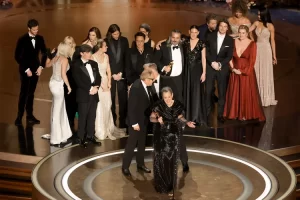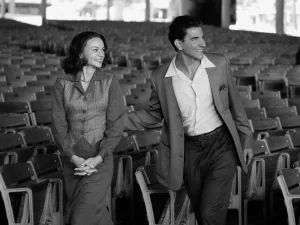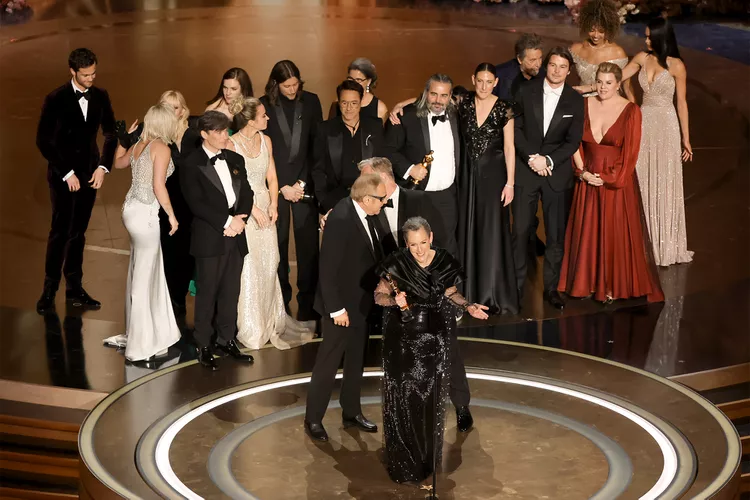In the glittering realm of Hollywood, where dreams are spun from celluloid and stars shine as brightly as the sun, the 2024 Oscars ceremony marked a historic moment for the film industry. Amidst a sea of glittering gowns and tuxedos, the night belonged to “Oppenheimer,” Christopher Nolan’s magnum opus that captivated audiences and critics alike with its gripping narrative and stellar performances. Let’s find out with Whoworlds.

Hosted by the irrepressibly witty Jimmy Kimmel, the Oscars ceremony was a dazzling affair, with celebrities and industry luminaries gathering to celebrate the best in filmmaking. As the anticipation reached a fever pitch, the moment arrived to announce the winner of the coveted Best Picture award. In a moment of sheer euphoria, “Oppenheimer” emerged victorious, clinching the top prize of the night and solidifying its place in cinematic history.
For producer Emma Thomas, whose unwavering dedication and creative vision were instrumental in bringing “Oppenheimer” to life, the win was the culmination of a lifelong dream. In a poignant acceptance speech that resonated with audiences worldwide, Thomas expressed her gratitude to the cast and crew who poured their hearts and souls into the film.

But it was Christopher Nolan, the visionary director behind “Oppenheimer,” who truly stole the spotlight. With his signature blend of spectacle and substance, Nolan crafted a cinematic masterpiece that transcended the boundaries of genre and captivated audiences with its bold storytelling and breathtaking visuals. As Thomas eloquently put it, “The reason this movie was the movie it was was because of Chris Nolan. He’s singular, he’s brilliant, and I am so grateful for you.”
Indeed, Nolan’s singular vision and unwavering commitment to excellence were evident in every frame of “Oppenheimer.” From the meticulously choreographed action sequences to the nuanced character development, the film bore the unmistakable stamp of a master filmmaker at the height of his powers.

But “Oppenheimer” was more than just a triumph of filmmaking craftsmanship; it was a poignant exploration of one of the most pivotal moments in human history. Set against the backdrop of World War II, the film tells the story of J. Robert Oppenheimer, the brilliant physicist who played a pivotal role in the development of the atomic bomb. As the world teetered on the brink of destruction, Oppenheimer grappled with the moral implications of his creation, grappling with questions of ethics, responsibility, and the nature of scientific progress.
In bringing Oppenheimer’s story to the screen, Nolan sought to shine a light on the complex moral and ethical dilemmas that defined the era. Through his meticulous attention to detail and unwavering commitment to historical accuracy, Nolan transported audiences back in time to a world on the cusp of cataclysmic change. The result was a film that resonated deeply with viewers, prompting reflection on the enduring legacy of the atomic age and the ethical challenges that continue to confront humanity to this day.
But “Oppenheimer” was more than just a history lesson; it was a visceral cinematic experience that swept audiences off their feet and left them breathless with wonder. From the heart-stopping action sequences to the intimate character moments, the film was a tour de force of storytelling that held audiences spellbound from start to finish.

Central to the film’s success was its stellar ensemble cast, led by the incomparable Cillian Murphy. With his magnetic presence and raw emotional intensity, Murphy delivered a tour de force performance that anchored the film and brought its central character to life with breathtaking authenticity. Alongside Murphy, a constellation of Hollywood’s brightest stars, including Emily Blunt, Matt Damon, and Florence Pugh, delivered performances of unparalleled depth and nuance, breathing life into a rich tapestry of characters that spanned the breadth of human experience.
But perhaps the most remarkable aspect of “Oppenheimer” was its ability to spark meaningful conversations and inspire audiences to grapple with profound questions about the nature of humanity and the ethical implications of scientific progress. As viewers emerged from theaters, their minds abuzz with ideas and emotions, they found themselves pondering the weighty themes and moral quandaries presented by the film, prompting conversations that reverberated long after the credits rolled.
In the end, “Oppenheimer” was more than just a movie; it was a cultural phenomenon that transcended the confines of the silver screen to become a touchstone of our collective consciousness. As audiences around the world embraced Nolan’s visionary masterpiece, they found themselves drawn into a world of wonder and intrigue, where the boundaries of reality blurred and the possibilities of the human imagination seemed limitless.
As the lights dimmed on the 2024 Oscars ceremony and the stars of Hollywood bid farewell to another unforgettable night, one thing was abundantly clear: “Oppenheimer” had left an indelible mark on the world of cinema, igniting imaginations, inspiring minds, and reminding us all of the transformative power of storytelling. And as audiences eagerly await Nolan’s next cinematic masterpiece, one thing is certain: the legacy of “Oppenheimer” will endure for generations to come, a shining beacon of cinematic excellence in an ever-changing world.
See more: Embracing Ramadan: A Compassionate Guide for Non-Muslim Friends and Colleagues

